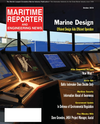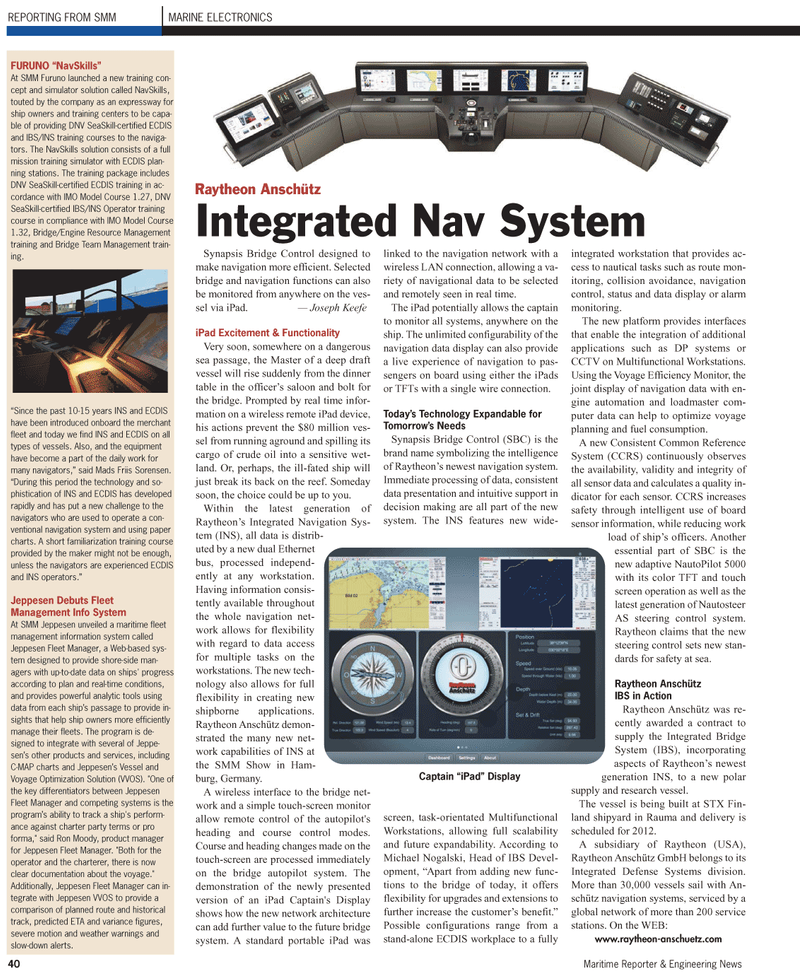
Page 40: of Maritime Reporter Magazine (October 2010)
Marine Design Annual
Read this page in Pdf, Flash or Html5 edition of October 2010 Maritime Reporter Magazine
40 Maritime Reporter & Engineering News
REPORTING FROM SMM MARINE ELECTRONICS
Synapsis Bridge Control designed to make navigation more efficient. Selected bridge and navigation functions can also be monitored from anywhere on the ves- sel via iPad. — Joseph Keefe iPad Excitement & Functionality
Very soon, somewhere on a dangerous sea passage, the Master of a deep draft vessel will rise suddenly from the dinner table in the officer’s saloon and bolt for the bridge. Prompted by real time infor- mation on a wireless remote iPad device, his actions prevent the $80 million ves- sel from running aground and spilling its cargo of crude oil into a sensitive wet- land. Or, perhaps, the ill-fated ship will just break its back on the reef. Someday soon, the choice could be up to you.
Within the latest generation of
Raytheon’s Integrated Navigation Sys- tem (INS), all data is distrib- uted by a new dual Ethernet bus, processed independ- ently at any workstation.
Having information consis- tently available throughout the whole navigation net- work allows for flexibility with regard to data access for multiple tasks on the workstations. The new tech- nology also allows for full flexibility in creating new shipborne applications.
Raytheon Anschütz demon- strated the many new net- work capabilities of INS at the SMM Show in Ham- burg, Germany.
A wireless interface to the bridge net- work and a simple touch-screen monitor allow remote control of the autopilot's heading and course control modes.
Course and heading changes made on the touch-screen are processed immediately on the bridge autopilot system. The demonstration of the newly presented version of an iPad Captain's Display shows how the new network architecture can add further value to the future bridge system. A standard portable iPad was linked to the navigation network with a wireless LAN connection, allowing a va- riety of navigational data to be selected and remotely seen in real time.
The iPad potentially allows the captain to monitor all systems, anywhere on the ship. The unlimited configurability of the navigation data display can also provide a live experience of navigation to pas- sengers on board using either the iPads or TFTs with a single wire connection.
Today’s Technology Expandable for
Tomorrow’s Needs
Synapsis Bridge Control (SBC) is the brand name symbolizing the intelligence of Raytheon’s newest navigation system.
Immediate processing of data, consistent data presentation and intuitive support in decision making are all part of the new system. The INS features new wide- screen, task-orientated Multifunctional
Workstations, allowing full scalability and future expandability. According to
Michael Nogalski, Head of IBS Devel- opment, “Apart from adding new func- tions to the bridge of today, it offers flexibility for upgrades and extensions to further increase the customer’s benefit.”
Possible configurations range from a stand-alone ECDIS workplace to a fully integrated workstation that provides ac- cess to nautical tasks such as route mon- itoring, collision avoidance, navigation control, status and data display or alarm monitoring.
The new platform provides interfaces that enable the integration of additional applications such as DP systems or
CCTV on Multifunctional Workstations.
Using the Voyage Efficiency Monitor, the joint display of navigation data with en- gine automation and loadmaster com- puter data can help to optimize voyage planning and fuel consumption.
A new Consistent Common Reference
System (CCRS) continuously observes the availability, validity and integrity of all sensor data and calculates a quality in- dicator for each sensor. CCRS increases safety through intelligent use of board sensor information, while reducing work load of ship’s officers. Another essential part of SBC is the new adaptive NautoPilot 5000 with its color TFT and touch screen operation as well as the latest generation of Nautosteer
AS steering control system.
Raytheon claims that the new steering control sets new stan- dards for safety at sea.
Raytheon Anschütz
IBS in Action
Raytheon Anschütz was re- cently awarded a contract to supply the Integrated Bridge
System (IBS), incorporating aspects of Raytheon’s newest generation INS, to a new polar supply and research vessel.
The vessel is being built at STX Fin- land shipyard in Rauma and delivery is scheduled for 2012.
A subsidiary of Raytheon (USA),
Raytheon Anschütz GmbH belongs to its
Integrated Defense Systems division.
More than 30,000 vessels sail with An- schütz navigation systems, serviced by a global network of more than 200 service stations. On the WEB: www.raytheon-anschuetz.com
Raytheon Anschütz
Integrated Nav System
FURUNO “NavSkills”
At SMM Furuno launched a new training con- cept and simulator solution called NavSkills, touted by the company as an expressway for ship owners and training centers to be capa- ble of providing DNV SeaSkill-certified ECDIS and IBS/INS training courses to the naviga- tors. The NavSkills solution consists of a full mission training simulator with ECDIS plan- ning stations. The training package includes
DNV SeaSkill-certified ECDIS training in ac- cordance with IMO Model Course 1.27, DNV
SeaSkill-certified IBS/INS Operator training course in compliance with IMO Model Course 1.32, Bridge/Engine Resource Management training and Bridge Team Management train- ing. “Since the past 10-15 years INS and ECDIS have been introduced onboard the merchant fleet and today we find INS and ECDIS on all types of vessels. Also, and the equipment have become a part of the daily work for many navigators,” said Mads Friis Sorensen. “During this period the technology and so- phistication of INS and ECDIS has developed rapidly and has put a new challenge to the navigators who are used to operate a con- ventional navigation system and using paper charts. A short familiarization training course provided by the maker might not be enough, unless the navigators are experienced ECDIS and INS operators.”
Jeppesen Debuts Fleet
Management Info System
At SMM Jeppesen unveiled a maritime fleet management information system called
Jeppesen Fleet Manager, a Web-based sys- tem designed to provide shore-side man- agers with up-to-date data on ships' progress according to plan and real-time conditions, and provides powerful analytic tools using data from each ship’s passage to provide in- sights that help ship owners more efficiently manage their fleets. The program is de- signed to integrate with several of Jeppe- sen’s other products and services, including
C-MAP charts and Jeppesen’s Vessel and
Voyage Optimization Solution (VVOS). "One of the key differentiators between Jeppesen
Fleet Manager and competing systems is the program’s ability to track a ship's perform- ance against charter party terms or pro forma," said Ron Moody, product manager for Jeppesen Fleet Manager. "Both for the operator and the charterer, there is now clear documentation about the voyage."
Additionally, Jeppesen Fleet Manager can in- tegrate with Jeppesen VVOS to provide a comparison of planned route and historical track, predicted ETA and variance figures, severe motion and weather warnings and slow-down alerts.
Captain “iPad” Display

 39
39

 41
41
